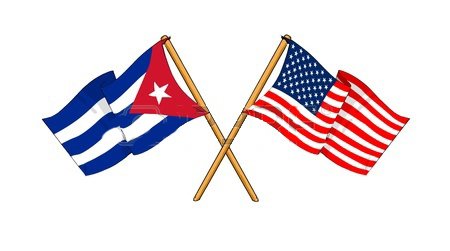President Obama puts the nations on the road to better relations
Egbert Gaye
There were muted reactions in both countries as the United States and Cuba embarked on the road to normal relations by resuming diplomatic ties severed more than 53 years ago.
The new phase in the broken relationship of the two hemispheric powers was launched with flag-raising ceremonies at the new Cuban embassy in Washington, D.C., and in the lobby of the State Department on Monday, July 20, which was followed by statements of cautious enthusiasm by the nations’ top diplomats.
U.S. Secretary of State John Kerry was quoted as saying: “We celebrate this day — July 20 — as a time to start repairing what has been broken and opening what for too long has been closed.”
He also added that: “This milestone does not signify an end to the many differences that still separate our governments. But it does reflect the reality that the Cold War ended long ago and that the interests of both countries are better served by engagement than by estrangement.”
His counterpart, Cuban Foreign Minister Bruno Rodriguez, cited “profound differences” between the U.S. and Cuban governments, but added that “we strongly believe that we can both cooperate and coexist in a civilized way based on due respect for these differences.”
However, Rodriquez also took the opportunity to reiterate his government’s long-standing position on the full normalization of relationships between the U.S. and Cuba.
“I emphasized that the total lifting of the blockade, THE RETURN of the illegally occupied territory of Guantanamo as well as full respect for Cuban sovereignty and compensation to our people for human and economic damages are crucial to be able to move toward the normalization of relations,” he said, standing side-by-side with John Kerry.
The troubling relationship between the two nations dates back to 1898 when Cuba was ceded to the U.S. by Spain after the Spanish-American War and with it self-declared legislative rights to intervene in the internal affairs of the Caribbean nation.
On two occasions the U.S. used its military might to occupy Cuba, one in 1912 to put down protests by Cuban Blacks agitating against discrimination. Relationships spiraled after the 1959 revolution by Fidel Castro who led about 9,000 men to overthrow the American-backed president Fulcensio Batista.
Castro’s early rule was marked by widespread economic reform. In 1960, he nationalized, without compensation, the mass of U.S. companies that controlled more than 75 per cent of the Cuban economy of the day.
The USA plotted for his demise. After several early failed attempts to get rid of Castro, on January 3, 1961, the United States broke off all diplomatic relations with Cuba and imposed a debilitating trade embargo. Over the following decades that embargo was made even more restrictive based on the vindictiveness of successive U.S. presidents, including Ronald Reagan and his hardline in the 1980s; Bill Clinton in 1999 who disallowed foreign subsidies of U.S. companies to trade with Cuba and George W Bush who tightened a travel embargo and cracked down on illegal cash transfers in 2003.
The blockade, or el blocquero as it is referred to in Cuba, has been described as the “most enduring trade embargo in modern history” and is estimated by the Cubans to have cost their economy almost U.S. $2 trillion.
The coming of President Barack Obama in 2008 signaled a thaw in the relationship as he pledged his intention to “begin a new chapter among the nations of the Americas and prod the United States of America to change its relationship with the people of Cuba.”
Then this past April he met with Cuban president Raul Castro and set out the blueprint for the reopening of diplomatic relations and to chart the course for the future.
Yet, as sun-shiny as things look today, there remains a lot of issues between the U.S. and Cuba still to be ironed out, notwithstanding the ideological tenor that colors the two political systems.
There is still the question of financial reparations, as the U.S. maintains its $6 billion in unpaid compensation from the Cuban government as established 53 years ago. Also, there is Cuba’s claim of the $1.3 trillion dollars loss to its economy over the decades.











